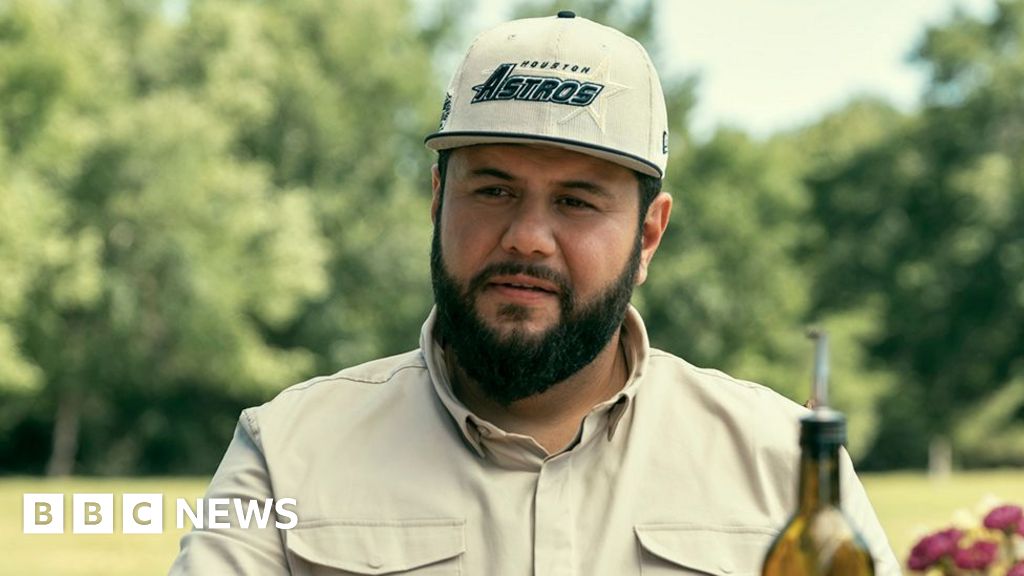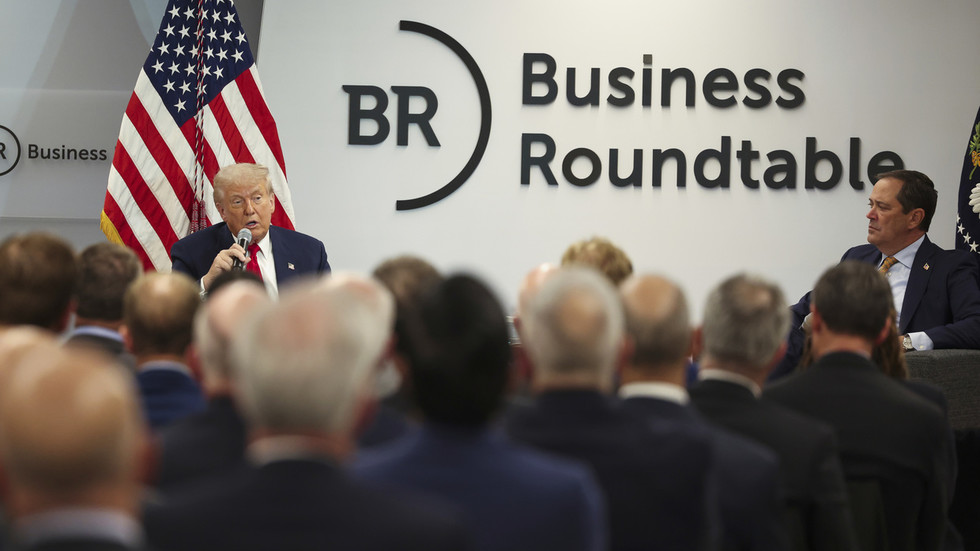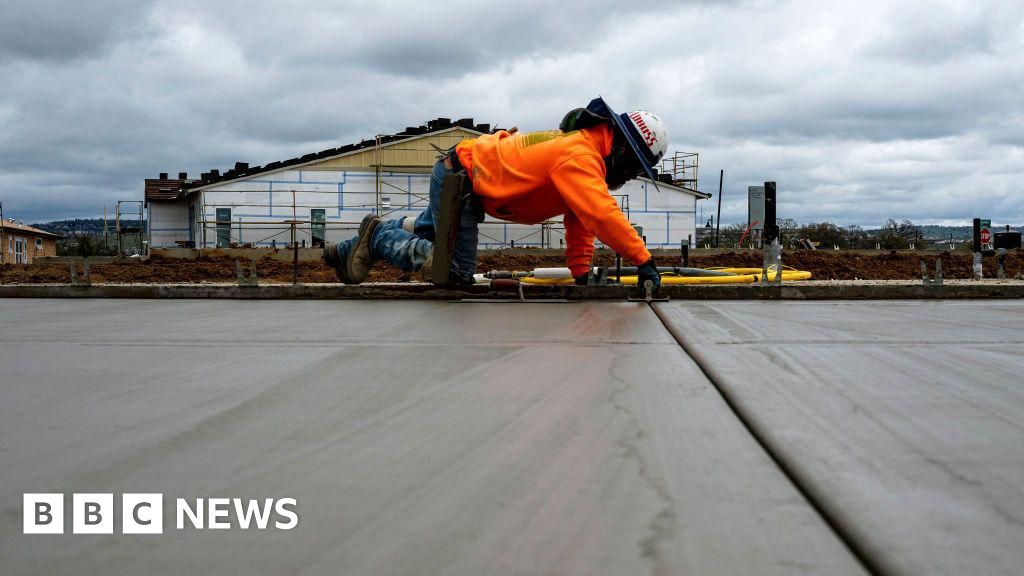
 Getty Images
Getty Images
A story posted on a mysterious website has been widely circulated on social media after it made a baseless claim that Kamala Harris - the Democratic presidential nominee - was involved in an alleged hit-and-run incident.
It claims, without providing evidence, that a 13-year-old girl was left paralysed by the crash, which it says took place in San Francisco in 2011.
The story, which was published on 2 September by a website purporting to be a media organisation called KBSF-San Francisco News, has been widely shared online. Some online posts by right-leaning users citing the story have been viewed millions of times.
BBC Verify has found numerous false details indicating it is fake and the website has now been taken down.
What is the claim?
The online article - accompanied by a five-minute video - contains an interview with a woman who it identifies as 26-year-old Alicia Brown and who it claims is paralysed.
There is no evidence to confirm her identity or whether she is paralysed (she is filmed sitting down and from the waist up in an undisclosed location).
The article refers to her as both Alisha and Alicia, without explanation.
In the video, she claims she was hit by a car while crossing the road in June 2011 with her mother in San Francisco and later claims, again without providing any evidence, that the person who hit her was Kamala Harris.
A narrator in the video then say this woman has undergone 11 surgeries and two X-rays are shown.
No evidence of the incident occurring nor the involvement of Ms Harris are provided.

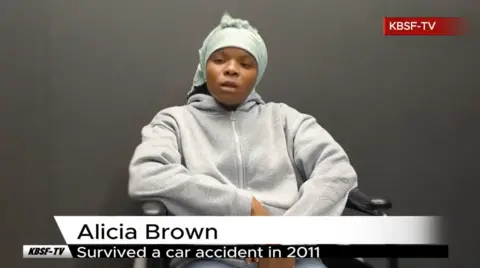 KBSF-TV
KBSF-TV
Why the story looks fake
BBC Verify ran a search for the website’s registration details, which revealed the domain was set up within the last few weeks - on 20 August 2024.
There is also no public record of a KBSF news outlet in San Francisco.
The website has now been taken offline and is no longer accessible.
The top image in the story, which also features in the video, shows a close up of a smashed car windscreen with what looks like a police officer and a number of fire crew standing by the side of the road next to it.
BBC Verify downloaded the image and searched for previous versions of it online - using a reverse image search tool - and found that it was originally posted in a news story about a crash in Mangilao, Guam, in 2018.

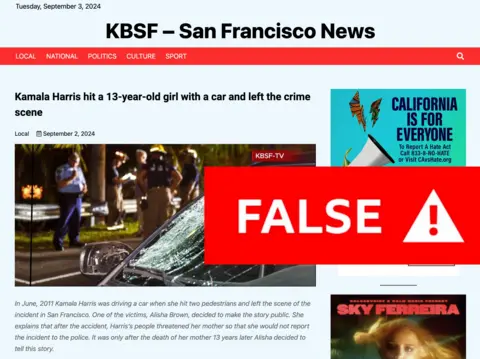 KBSF-TV
KBSF-TV
The hit-and-run story as it appeared on the KBSF - San Francisco News website
Next, we examined the X-rays shown in the video.
Using reverse image search again, it is clear that these images have been lifted from medical research articles posted in 2010 and 2017.
According to the articles, the first X-ray belongs to a 58-year-old patient admitted to a hospital in China.
The second X-ray belongs to a 12-year-old girl admitted to the Radboud University Medical Center in the Netherlands.
On the video interview itself, we approached several experts to see whether it had been generated by AI.
Professor Hany Farid, an expert in digitally manipulated images, analysed the video and found no evidence of digital manipulation or AI-generation in either the audio or visuals.
“I think it is most likely that this is an old-fashioned (and not particularly well executed) cheap fake that is simply staged,” he said.
Prof Farid explained that unlike “deepfakes” which are typically created or edited by using artificial intelligence tools, a “cheap fake” can be created by using lower-tech software that is cheaper and more accessible.
A cheap fake, he said, encompasses everything from slowing down an audio to make someone sound drunk to cropping an image.
“It is a good reminder that we don't need a lot of technology to perpetrate lies,” Prof Farid added.
We looked for any press reports from 2011 about a hit and run incident in San Francisco allegedly involving Ms Harris - who was then Attorney General of California - but could find none.
We have also contacted the San Francisco police department and the Harris campaign.

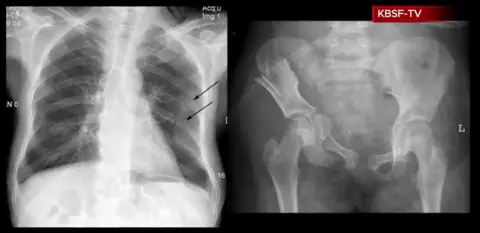 KBSF-TV
KBSF-TV
X-rays alleged to belong to Alicia Brown have been lifted from online medical journals
Fake news stories targeting the US
The story and the website it originally appeared on share striking similarities with a network of fake news websites that masquerade as US local news outlets, which BBC Verify has previously extensively reported on.
John Mark Dougan, a former Florida police officer who relocated to Moscow is one of the key figures behind the network.
Approached by BBC Verify to comment on the hit-and-run story, Mr Dougan denied any involvement, saying: “Do I ever admit to anything? Of course it’s not one of mine.”
The websites mix dozens of genuine news stories taken from real news outlets with what is essentially the real meat of the operation - totally fabricated stories that often include misinformation about Ukraine or target US audiences.
The websites are often set up shortly before the fake stories appear on them, and then go offline after they serve their purpose.
These fabricated stories often include videos featuring people who claim to be “whistleblowers” or “independent journalists”. In some cases the videos are narrated by actors – in others it appears they are AI-generated voices.
Examples of the fake stories include a rare Bugatti car purchased by Ukraine’s first lady Olena Zelenska, an expensive UK mansion purchased by President Zelensky, and a secret wiretapping operation at Donald Tump’s Mar-a-Lago residence.



 6 months ago
14
6 months ago
14



